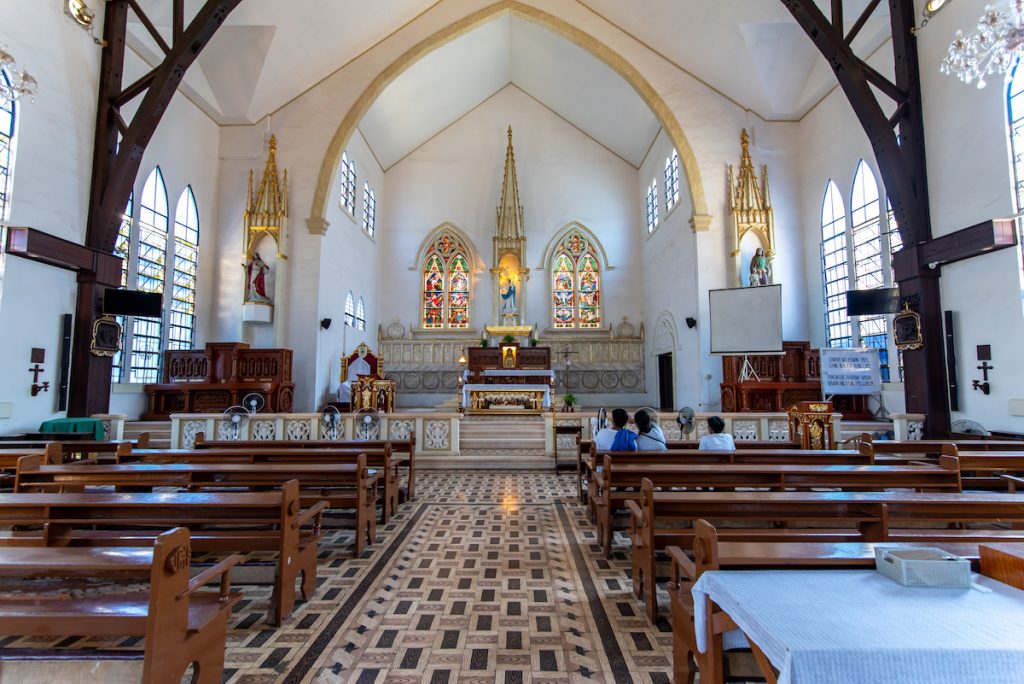So, what if the number of priests in this vicariate in the central Philippines has been dwindling over the years?
The lack of an adequate number of Catholic priests in Palawan province has not been an obstacle for those who still preach the Gospel and perform social action work under less than ideal conditions.
In fact, the Apostolic Vicariate of Palawan — an island province facing the South China Sea — is actively involved in environmental protection activities.
Last year, in response to Pope Francis’ encyclical Laudato Si’, the vicariate managed to plant 10,000 trees at the Mount Mantalingahan Protected Landscape in Brooke’s Point town as part of its program to help the province become greener.
This year, the vicariate initiated a rattan planting project with tribal communities also in Brooke’s Point.
According to Bishop Socrates Mesiona of Puerto Princesa, rattan seedlings are now being prepared and will be planted at the Mount Panwan at the start of the rainy season a few months from now.
The project aims to plant 20,000 rattan trees in partnership with the Augustinian Missionaries of the Philippines-Indigenous Peoples Mission.
Rattan is a naturally renewable palm that grows in tropical regions and is used for furniture, handicrafts, and building material, among others.

For Bishop Mesiona, the revival of rattan plantations in the province is not just a greening project but also a livelihood program for Pala’wan tribespeople.
Last year, the bishop appealed to authorities to help save the country’s “last ecological frontier” amid plans to build a coal-fired power plant in the province. He urged the government to reassess the project because of its possible negative impact on the environment.
Addressing environmental degradation and helping indigenous people with livelihood projects are only two aspects of the work of the Catholic Church in the province.
Apart from helping preserve ecological balance in the province, the vicariate is also involved in a program to help persons living with HIV and depression.
According to Father Eugene Elivera, the coordinator of the program, their advocacy aims to eliminate discrimination and stigma against people living with HIV and those undergoing depressive disorder.
“The Church will reach out to those people to provide them support, especially those who feel that they are discriminated because of the stigma attached to their health condition,” he said.
“We will reach out to their families to support them fully because they have tasks and responsibilities on their loved ones so they won’t feel neglected. We also want to campaign for awareness about the HIV and mental depression,” added the priest.
Father Elivera emphasized that public support is important in ensuring that people living with HIV or depression are not subjected to shame or disgrace because they are marked as different.
He pointed out that the existing stigma against someone living with depression and HIV drives him/her away more from seeking treatment which could lead to suffering in silence and damage to their mental health.
“You could hardly talk about suicide if you have it as your personal problem. For example, somebody died because of suicide, it’s taboo to talk about which makes it hard for the social problem to be addressed properly,” he said.
Father Elivera also lamented the lack of needed medical services in Palawan where mental health problems are a concern.

But yet another urgent need at present is to augment the number of priests in the province.
Right now, the vicariate has only around 37 diocesan priests and about 22 religious priests serving in 29 parishes.
According to Father Roy Vasquez, rector of Seminario de San Jose in Puerto Princesa, they are now facing a situation where vocation to the priesthood is a dire need.
“We really lack priests in terms of numbers, we need more workers in the vineyards,” he pointed out during a Mass at the Immaculate Conception Cathedral last month.
He stressed that many priests are already in their senior years and the local Church needs potential replacement from young people.
The diocese expects the next ordination of would-be priests in the next three or even more years.
The declining numbers of priestly ordinations in the province underscores the need to increase vocations if the vicariate wants to replace the number of retiring priests.
The Seminario de San Jose is the only seminary in Palawan that caters to students from the Vicariate of Puerto Princesa and Taytay.
In his pastoral visits to parishes, Bishop Mesiona has been appealing to the faithful to pray for more vocations.
The Apostolic Vicariate of Puerto Princesa operates like a diocese and is headed by a titular bishop. Its episcopal see is the Immaculate Conception Cathedral-Parish in Puerto Princesa in Palawan, which has a population of 600,000, more than half of whom are Catholics.
It is not a part of an ecclesiastical province as it is directly subject to the Holy See, yet for the purpose of apostolic cooperation usually grouped with the Archdiocese of Manila, along with the Roman Catholic Vicariate of Taytay.






